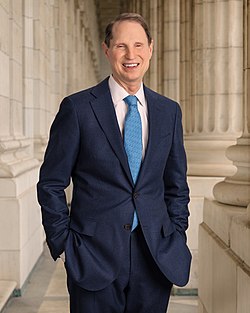Modern era
After election losses in 2004, the Democratic Party reexamined its position on gun control which became a matter of discussion, brought up by Howard Dean, Bill Richardson, Brian Schweitzer and other Democrats who had won in states where Second Amendment rights are important to many voters. The resulting stance on gun control brought in libertarian minded voters, influencing other beliefs.
In the 2010s, following the revelations by Edward Snowden about NSA surveillance in 2013, the increasing advent of online decentralization and cryptocurrencies like Bitcoin, the perceived failure of the war on drugs and the police violence in places like Ferguson, Democratic lawmakers such as Senators Ron Wyden, Kirsten Gillibrand and Cory Booker and Representative Jared Polis have worked alongside libertarian Republicans like Senator Rand Paul and Representative Justin Amash to curb what is seen as government overreach in each of these areas, earning plaudits from such traditional libertarian sources as Reason magazine. [3] [4] [5] [6] The growing political power of Silicon Valley, a longtime Democratic stronghold that is friendly to economic deregulation and strong civil liberties protections while maintaining traditionally liberal views on social issues, has also seriously affected the increasingly libertarian leanings of young Democrats. [7] [8]
The libertarian faction has influenced the presidential level as well in the post-Bush era. Alaska Senator and presidential aspirant Mike Gravel left the Democratic Party midway through the 2008 presidential election cycle to seek the Libertarian Party presidential nomination, [9] and many anti-war and civil libertarian Democrats were energized by the 2008 and 2012 presidential campaigns of libertarian Republican Ron Paul. [10] [11] This constituency arguably embraced the 2016 and 2020 presidential campaigns of independent Democrat Bernie Sanders for the same reasons. [12] [13] In the state of New Hampshire, libertarians operating from the Free State Project have been elected to various offices running as a mixture of both Republicans and Democrats. [14] [15] A 2015 Reuters poll found that 22% of Democratic voters identified themselves as "libertarian," more than the percentage of Republicans but less than the percentage of independents. [16]





